Rick's b.log - 2014/02/17
You are 18.118.144.199, pleased to meet you!
Rick's b.log - 2014/02/17 |
|
| It is the 24th of November 2024 You are 18.118.144.199, pleased to meet you! |
|
mailto: blog -at- heyrick -dot- eu
What is dyscalculia? Well, Wiki will probably give you a description using more words than is necessary, so I will say it more simply - a primary failure to "understand" numbers. You've heard of dyslexia, right? Reading difficulty? Well, it's the same thing, only with digits.
Or, to put it another way - explain to me what "two" is. You can give me a metric tonne of examples, couples in love, wheels on an axle, and so forth. These are, sadly, simply examples of "two". I can picture snoggy-couples, I can picture an axle. I can't picture "two".
But what is much harder to explain is the result of four hundred and thirty three divided by twenty seven. If you worked that out in your head, whoo you. I use a calculator because I just don't get long division. At all.
For this reason, it was interesting when a posting on The Register's comments forum mentioned about how appallingly bad the current Maths GCSE is. I thought I might go and have a look.
For non-Brits, our "school leaving" (or not, if you stay on for sixth form) examination is the "GCSE". Mathematics in my day was split into three levels - basically: smartass, average, dunce. Well, they used better names, but that's what it equated to. These days, there is an "advanced" tier and a "foundation" tier.
The examination that I am describing is the "Foundation tier" of Mathematics (Unit 1) which can be your end-of-education school leaving exam.
You can download this paper, and a variety of others, from: http://www.wjec.co.uk/index.php?subject=90&level=7&list=paper.
The examination was checked over by my mother.
Got the right answer though. ☺
Mom, who listens to way too much cricket on Radio 4 LW, wants to clarify this as: Adam is a much better batter, as in, he could suck as a fielder.
I mean, I could understand if Asif (a good solid Anglo-Saxon name, that!) drove 270 miles and used 28 litres, if the exam wanted to know how far he could drive if his car takes 35 litres on a fill; or how much petrol is required to drive a hundred miles.
Surely I'm missing something?
and finally:
Now, I don't claim to be any good at maths, but apart from the screw-up on page 5,
One thing that my mother and I both agree on is that this exam is horrendous for a GCSE level examination. Foundation tier or not, this should not be your school leaving exam.
No. You should not be allowed to 'graduate' from Primary School until you can pass this.
I'm sorry, I just can't get over page 4.
Are English kids really this dumb?
Are English kids really this dumb?
I "suffer" from dyscalculia. This is not something I ever tried to hide from anybody. I put "suffer" in quotes because while some of life's more interesting mysteries remain just a little out of my reach, this isn't really something that afflicts me in my day to day life.
Now, bring in another "two" and using some magic called addition, we can stick them together. But we don't end up with two-two, we end up with something entirely different. Something called "four". How do we get "four" from two twos? I know that 2+2=4 because I've spent a decade goofing off in maths class, and another 30 years not particularly regretting it. I can tell you that the five times table is 5, 10, 15, 20, 25, 30, and so on. The eight times table is 8, 16, 24, 32, blah blah. And maybe more relevant to geeks, the order 1, 2, 4, 8, 16, 32, 64, 128, 256, 512, 1024, 2048, 4096...... I know this stuff because I have done it over and over. Like ichi, ni, san, yon, go, roku, nana...
Keep this in mind.
This paper, and the questions within, are © WJEC CBAC Ltd; given these scans are of my completed version, I am assuming "fair use" applies.
Page 1
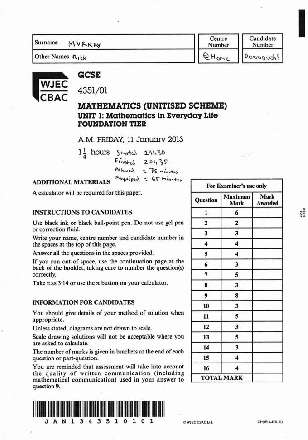
Note that a calculator is required.
Page 2
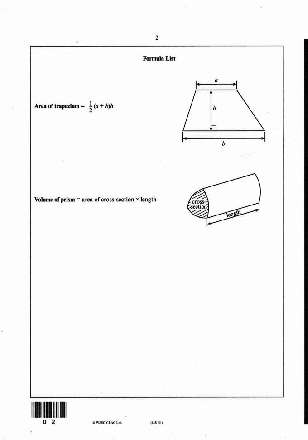
Page 3
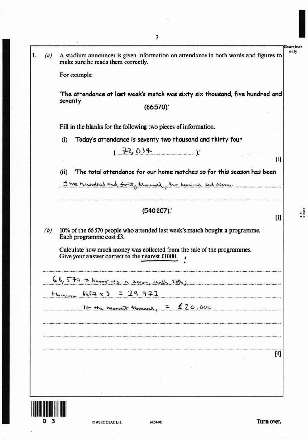
Then a question with a sting - they don't want to know the correct answer, they want it to the nearest thousand. This is as much basic maths as seeing if you are capable of reading the question.
Page 4
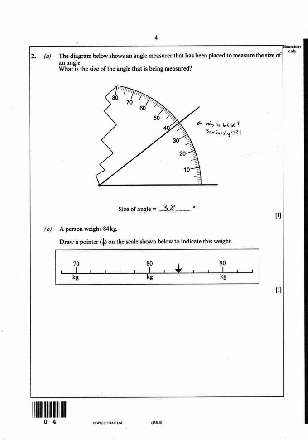
I have nothing to add, except that I wanted to write "<facepalm!> below question 2(b).
Page 5
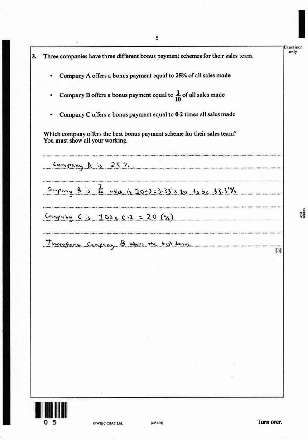
I mean, I can tell just looking at it that the amounts are 25%, 30%, and 20%. But, you know, gotta show your working. So I did, and somewhere along the way got it into my head that working out 3/10ths was just dividing 10 by 3. Duh! Duh! Duh! [but see page 11]
Page 6
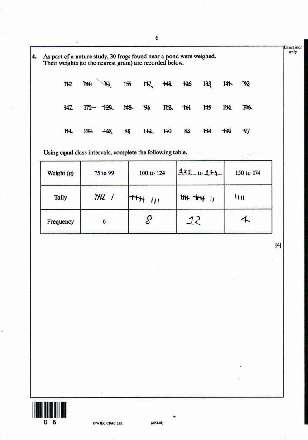
Page 7
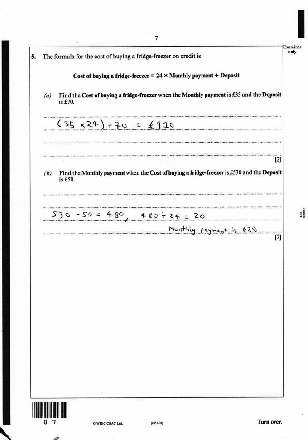
Page 8
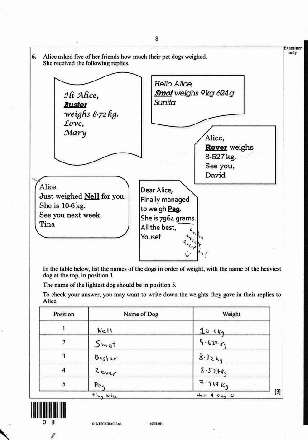
I added "Tiny Alice" (our cat) and "about 4.5kg" to the bottom.
Page 9
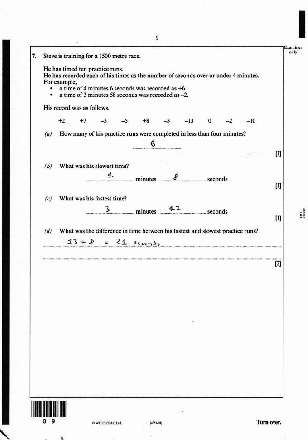
I programmed a joystick once that returned a value for its home position, and knowing if the value was more or less (and how much) would indicate the movement of the joystick. [Yay! I'm fit to participate in the Year Of Code! Way-hey!]
Page 10
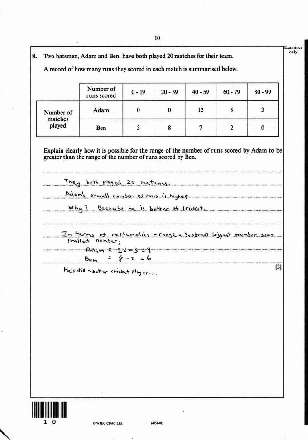
That was a rather crappy answer, so I put it down to Adam just simply being a better cricket player.
Page 11
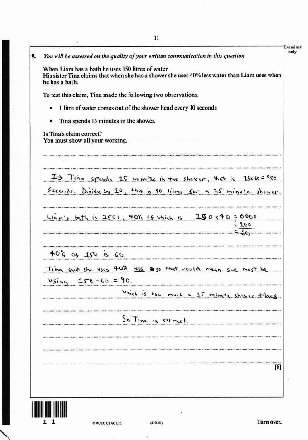
So I did.
This is what used to annoy the hell out of me in maths tests. A lot of the time, I could get an answer, but be unable to explain how I got the answer. Like for the question on page 5, I know three tenths is 30%. I can't tell you how I know it. I just do.
Page 12
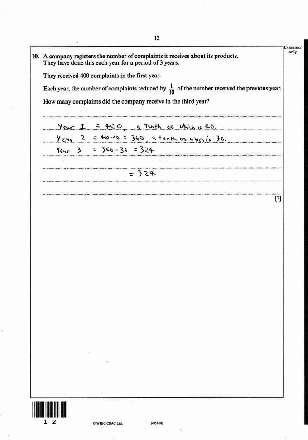
Notice it ends at year #3. If you perform the calculation onwards, you'll see that you arrive at a number that is not whole. How do you count a 'part' of a complaint? But, wait, this is a foundation maths GCSE - we'll stop before this gets, you know, complicated.
Page 13
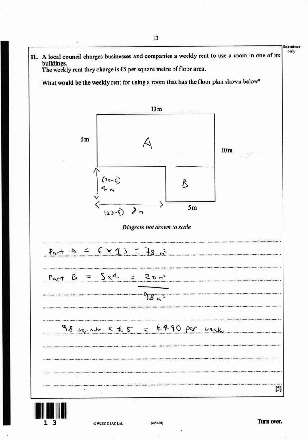
Page 14
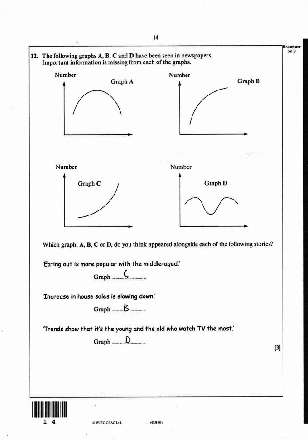
Mom is usually correct so... I will call this one I got wrong.
Page 15
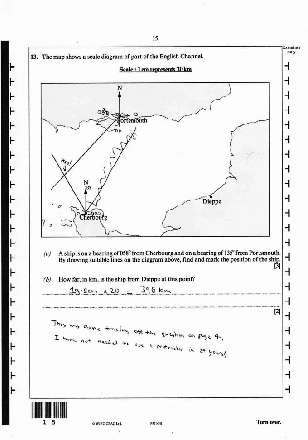
However, give me a point for working out how to get 135° from a chart that only goes up to 80°!
Page 16
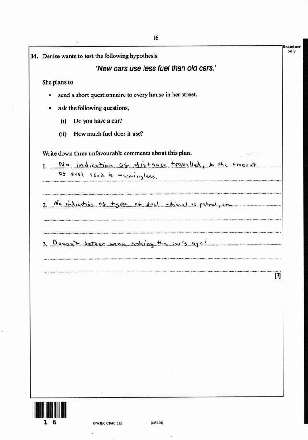
Page 17
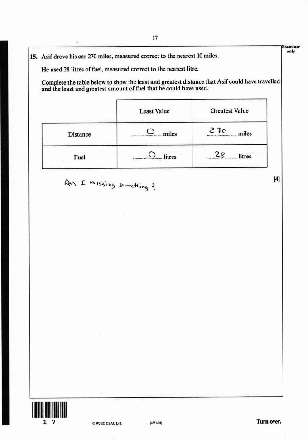
But no.
The only thing I could determine from this question is that the least possible is nothing at all, and the most is... what he did.
Page 18
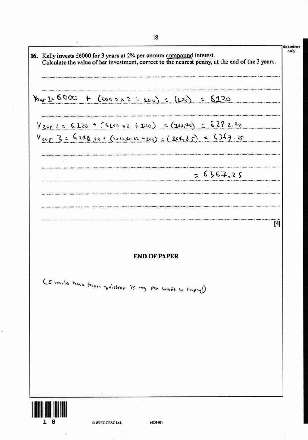
And, for those of you who'd like to do this in their heads, it is pretty simple to work out 2%. Move the decimal point one place to the left to get ten percent (ie 6000 becomes 600.0) and then move it another place to the left to get one percent (so now 60.00). Multiply that by two (to be 120.00). Add this in, year #1 is 6120.00 and we didn't even need a calculator.
Page 19
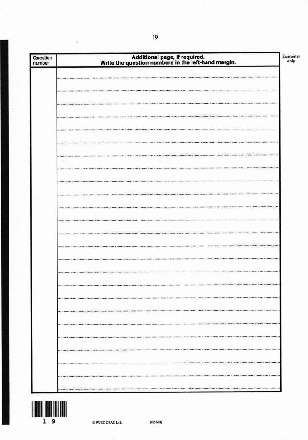
Page 20
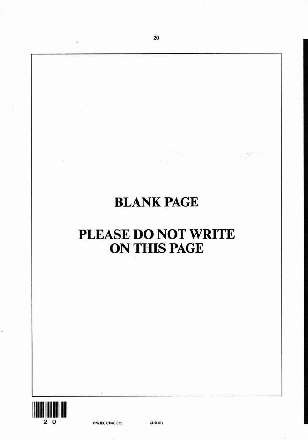
I guess it was too challenging to think up a 17th question?
possiblyprobably page 14, and simply not getting page 17, I think I've done okay. Feel free to point out my many actual errors in the comments below! (^_^)
Gavin Wraith, 18th February 2014, 12:34
I remember when I was in kindergarten having to wade through red books of "sums". Once I asked an elder girl sitting next to me what the mysterious letter "R" meant in the sums further on from the page I was supposed to be ploughing through. "You are much too young to know", she sniffed. In retrospect I believe it stood for "remainder".
After kindergarten I was lucky to have good teachers, and I loved mathematics. Still do. Sadly, most people only get to meet elementary arithmetic or maths used for calculations ("applied maths"), and not as a tool for analysing structures and relationships.VinceH, 18th February 2014, 15:04
If 28 litres of fuel is measured to the nearest litre, then the least would be 27.5 litres (.5 is always rounded up) and the greatest 28.4 litres. (Note: I'm assuming 1dp).
Similarly, if 280 miles is to the nearest 10, then the least (should be fewest, really) would be 275, and the greatest 284 (in this case I'm using whole miles).
Your answer to question 13 (the ship) is also incorrect - but given how you came up with the angles (the protractor diagram possibly being inferred to mean anticlockwise) understandably so.
Bearings are measured clockwise from either North or South - but with that not being specified, since it's a map of an area in the Northern hemisphere, take North as read.
So 58 degrees from Cherbourg would be heading to the right and up - closer to your original line (though that looks closer to 30-35 degrees to me). Similarly, the line 135 degrees from Portsmouth would be heading down and to the right - very specifically, South East.Gavin Wraith (again), 18th February 2014, 17:08
1) Rote learning is a necessary, and enjoyable, thing so long as you are young enough. Just because adults find it unpalatable does not mean that kids do. But you have to get it in (times-tables, language vocabulary) early enough.
2) Mathematical abstractions (notoriously, set theory) should not be imposed on kids until they are ready - usually in the early teens. Just because adult teachers like it does not mean that it is educationally appropriate.
3) To learn maths you have to be able to claim it as your own, in your own good time. That is why it is virtually impossible to teach groups of more than 6 at a time, because with any more the teacher has no time to appreciate what each is ready for.
4) Maths is a structure that has evolved through time. Kids should appreciate that is a human endeavour, not something handed down from on high. Theorems, constructions, ideas, etc are always named after people (sometimes the wrong people) and kids should be taught this from the start. At my school such things were temporarily renamed after a member of the class - "please describe your famous formula, Sage Minor" - just to rub this point in. You cannot do maths without having a glimpse of history and of where it came from.
5) The emphasis on getting a correct answer to some calculation or other has been deadly. Yes, kids need to know how to get the answer, and to be able to estimate when an answer is reasonable. Far more important is the ability to tell sense from nonsense.
The emphasis on ticking boxes sometimes turns otherwise intelligent kids into hysterical idiots who have no idea whether what they are saying or writing makes any sense. If maths education has anything to recommend it I would rate the ability to follow a logical argument, and the ability to frame one, far above the ability to calculate.Trevor Johnson, 18th February 2014, 17:11 Hagbard, 19th February 2014, 12:40
http://education.theguardian.com/gcses2000/story/0,,358622,00.html
I did mine in 1983 and remember it being reasonably challenging.
Sara, 19th February 2014, 19:38
Mr Wraith says that it is important to teach everybody at their level and this is very very true. The Wikipedia page for GCSE tells me that the most you could have for this examination is a C grade. Having made mistakes would this be a D or an E? You can clearly do better than that.
Perhaps you should try the advanced level examination? I am horrified that your country will send children away from school only capable of that - such young adults would be too poorly educated to have any hope of a career path. I am interested to know what the other option is.Rick, 19th February 2014, 22:41
VinceH, Sara - seriously? All that question wanted was to know if you understand rounding? That's IT? <facepalm!> <facepalm!> <facepalm!> :-(
Gavin, Sara - I fully agree that people need to be taught at a rate that suits them. Some classes can be extraordinary large - I was lucky, as it was a "special needs" boarding school, classes were fairly small; however the "comprehensive" I was briefly in had large classes (30-35ish). Because of the large classes, I wonder how it is possible to make anything coherent work? Could the average LEA justify the cost of teaching maths to pupils six at a time? If this examination is an indicator, it would appear better to just not bother and understand that this is all they get. I wonder if, years from now, they'll realise and feel cheated?
Trevor - I don't know anything about the French exams. Given that I can sometimes out-think checkout girls by giving amounts of change that result in a single coin being handed back to me, but instead they look confused and try to give me back the odd change, I wonder if their lower tier is also as useless?
Sara - thanks for the vote of confidence. I took the intermediate GCSE in 1990 and got a C grade (which means that I got most of it right). I physically walked myself out of the maths class I was in because the teacher had no qualms about running ahead with the capable boys, and I got to the point where I plain didn't understand the lesson. I put myself in the intermediate group. Perhaps I could have stayed in the upper if the teacher wasn't such a dick? I dunno, given my lack of ability I was happy with a C. Thus, I think I'll give the advanced paper a miss, if you don't mind. :-) The aim of this piece was to demonstrate what the lower-tier end-of-school maths exam actually is.
What may be interesting is for somebody more capable at maths to try the 2013 upper tier and then the 1985 O level and compare the two? Any takers? ;-)Gavin Wraith, 20th February 2014, 11:36
At the boarding school that I attended from seven to twelve years of age the maths teacher instituted what he called The Royal Society of Twerps. Those whom he
enrolled in it met twice a week in his home for extra coaching, to catch up, and were plied with cake and cocoa by his wife.
At university, when students do analysis (i.e. the theoretical underpinnings of calculus) they generally have more difficulty with this topic than any other, probably because notions like "continuity" and "differentiability" involve a logical complexity that they will not have encountered at school. For that reason we had a sinking-in principle that analysis should not be examined until two years after it was taught. Alas, this civilized principle was scuppered by the university's insistence on a year-by-year modularity principle, for the sake of homogeneity across the university. In vain did we argue that bureaucratic convenience was trumping didactic experience. Draw your own conclusions.Steven Hawking, 1st March 2014, 22:57
That's a VERY simplified explanation of how part of MP3 compression works. (There's a bit more to it than that of course.)
| © 2014 Rick Murray |
This web page is licenced for your personal, private, non-commercial use only. No automated processing by advertising systems is permitted. RIPA notice: No consent is given for interception of page transmission. |